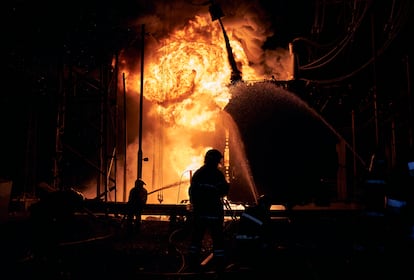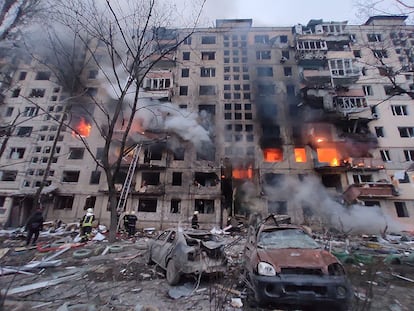Russia uses winter as a weapon to try and subdue Ukraine
Moscow has carried out an intensive wave of bombing on energy supply infrastructure with the main objective of causing suffering for the civilian population as the cold sets in


Russia is deploying a new weapon in the Ukraine war: winter. The heaviest bombing campaign since the beginning of the war in February and March has mostly targeted critical infrastructure of Ukraine’s power generation and distribution network, damaging 40% of the production capacity of the country’s energy installations as temperatures plummet. The Ukrainian authorities have described Moscow’s tactic, which is designed to inflict suffering on the civilian population, as a war crime.
As of last Monday, sustained attacks have been launched on a daily basis by Russian forces on civilian and infrastructure targets using cruise missiles and suicide drones. The intensity of the bombing campaign has been decreasing over the past few days, but it remains active. On the first day of this latest campaign on October 10, Russian forces fired 80 missiles into Ukrainian territory, of which around half were intercepted by Kyiv’s air defense systems, according to the Ukrainian general staff. The following day, that number fell to 28 cruise missiles, backed by 13 Iran-produced Shahed 136 drones.

Putin: large-scale attacks now finalized
Russian President Vladimir Putin said on Friday that large-scale attacks had now been finalized after Moscow reported the destruction of 20 military and energy infrastructure targets. However, air strikes continued to hit strategic power supply targets on Saturday in Ukraine’s two major cities, Kyiv and Kharkiv, as well as in Zaporizhzhia, which is around 25 kilometers (15 miles) from the front lines and has been the target of Russian strikes for the past three weeks.
Ukraine’s Energy Minister Herman Haluschenko said last Tuesday that around 30% of the country’s power generation network had been targeted by Russian air strikes. That percentage had risen to 40% by Thursday, according to analysis by the Ukrainian energy research reference center (DiXi). Ukraine has suspended energy exports to the European Union due to power cuts in cities including Lviv and Ivano-Frankivsk in western Ukraine and Kharkiv and Dnipro in the east. Ukrenergo, the state-owned company that manages and operates Ukraine’s power grid, has said that since Wednesday it has managed to shore up supply and prevent any cuts, and while it expects this to remain the case it has called on the population to reduce consumption where possible.
In a statement issued on Friday, Ukrenergo called on Ukrainians to make every effort to reduce consumption. On October 12, in the aftermath of the two largest waves of strikes, overall consumption had only been reduced by 4%, according to the company. A day later, that figure was even smaller, at 2.2%. “We remind everyone that responsible and economical electricity consumption is an opportunity for the complete repair of networks, helping to balance the energy system and our contribution to the fight against the enemy,” Ukrenergo said.
Lead analyst at DiXi, Roman Nitsovich, said that in addition to damages to 40% of the country’s energy production capacity, “hundreds of kilometers of electricity and gas networks” had also been compromised by Russian strikes. Nitsovich also confirmed that all of Ukraine’s oil refineries had been destroyed. Since the summer, queues of tankers importing fuel have been forming on Ukraine’s border with Poland. Large repositories belonging to Ukraine’s major oil companies have been systematically disabled by Russian attacks since the beginning of the invasion.
A total of 20 Ukrainian provinces have been under Russian bombardment this week. Even Lviv, the largest city in western Ukraine and 700 kilometers (430 miles) from the nearest front line, has been severely hit. The majority of Lviv’s population of over 700,000 were without power for two days while Moscow targeted electrical substations in the area. The most important fuel storage plant serving the city, which was destroyed by Russian Kalibr precision missiles in March, was located in the center of Lviv.
Ukraine is currently dependent on electricity generation by coal-fired thermal power plants, a natural resource that the country possesses in abundance. It is also a sector that has been repeatedly targeted by Russian strikes over the past two months. In September, after Kyiv launched its counter-offensive on the eastern and southern fronts, Moscow launched missile attacks on power plants in large cities including Kharkiv. The two largest coal mines still under Ukrainian control, located near Kryvyi Rih, were attacked during the past week when the electrical and water supply systems necessary for their operation were destroyed. Three combined heat and power plants have also been damaged in Kyiv over the past few days, as well as a thermal power plant in Vinnytsia and another in Ivano-Frankivsk.
Power cuts have not been generalized because other than a few electrical substations, Russian strikes have failed to completely knock out Ukraine’s energy supply facilities and Ukrenergo has worked around the clock to patch up the damage caused. There is however a basic lack of resources such as water, electricity and gas in the majority of the towns and villages near the front lines, above all in the Donbas region.
Nitsovich stated on his report that Ukraine has reserves of 14 billion cubic meters of natural gas and two million tons of coal to face the winter. However, in the expert’s opinion, if Moscow sustains its attacks on the power grid international aid will be vital for the supply of emergency material such as mobile boilers, generators and water purification systems.
A message to Ukraine’s richest man
Moscow also sent a message last week to Rinat Akhmetov, Ukraine’s wealthiest individual and owner of several large companies, among them DTEK, the country’s biggest energy investment fund. DTEK’s headquarters, one of the most recognizable skyscrapers in downtown Kyiv, was hit by Russian air strikes on October 10 during the first wave of bombardments. Akhmetov, who was born in the recently illegally annexed region of Donetsk, has been a vocal supporter of Kyiv’s war of liberation against the Kremlin despite his lengthy political and economic ties with Russia. Akhmetov presented a complaint to the European Court of Human Rights in June over the destruction of the DTEK-owned Azovstal iron and steel works in Mariupol - and the deaths among its defenders - one of the most emblematic acts of defiance by Kyiv during the early stages of the invasion. Russian daily Pravda estimated in a report published on October 3 that Akhmetov has lost around half his fortune since 2014, when pro-Russian separatists backed by Moscow launched an insurgency in Donbas, through the expropriation of assets.
Putin has justified the massive bombardments of the past week as retaliation for the partial destruction of the Kerch Bridge on October 8, the only land link between Russia and the illegally annexed region of Crimea and an important logistical and symbolic piece of infrastructure for Moscow’s expansionist designs. However, in an article published by the Atlantic Council think tank, US-Ukrainian organization Razom said that the latest offensive was premeditated: “The dimension of these attacks indicates weeks or months of preparation. Dozens of targets in towns and cities across Ukraine had to be identified and confirmed; missiles, bombers, warships and drones had to be mobilized and prepared. These are not actions that can materially be prepared in just two days,” Razom stated.
Tu suscripción se está usando en otro dispositivo
¿Quieres añadir otro usuario a tu suscripción?
Si continúas leyendo en este dispositivo, no se podrá leer en el otro.
FlechaTu suscripción se está usando en otro dispositivo y solo puedes acceder a EL PAÍS desde un dispositivo a la vez.
Si quieres compartir tu cuenta, cambia tu suscripción a la modalidad Premium, así podrás añadir otro usuario. Cada uno accederá con su propia cuenta de email, lo que os permitirá personalizar vuestra experiencia en EL PAÍS.
¿Tienes una suscripción de empresa? Accede aquí para contratar más cuentas.
En el caso de no saber quién está usando tu cuenta, te recomendamos cambiar tu contraseña aquí.
Si decides continuar compartiendo tu cuenta, este mensaje se mostrará en tu dispositivo y en el de la otra persona que está usando tu cuenta de forma indefinida, afectando a tu experiencia de lectura. Puedes consultar aquí los términos y condiciones de la suscripción digital.








































